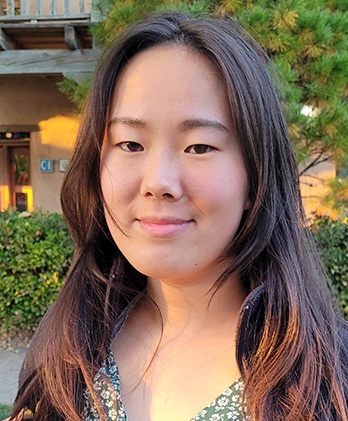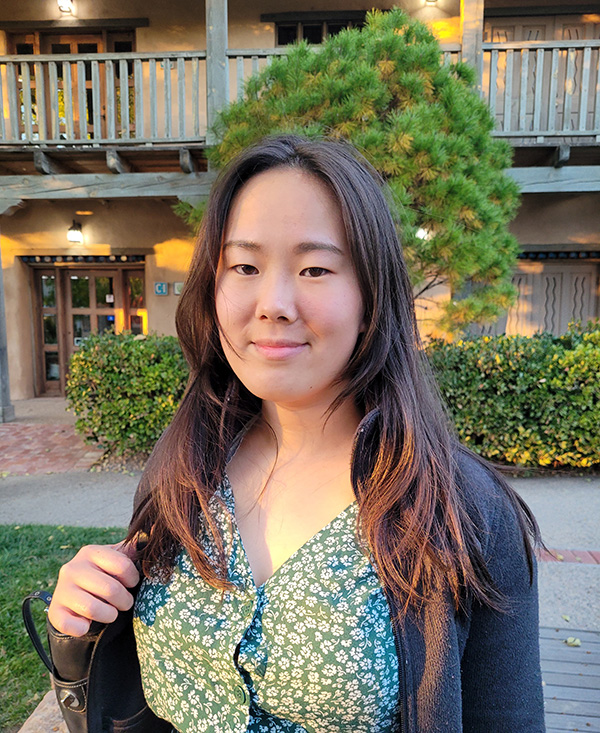The stigma that surrounds menstruation has been a roadblock to Ugandan girls’ education and integrity for years. One University of New Mexico School of Medicine student is working to change that.
Hyesun Choi helped co-found Sunny Smiles Initiative, a non-profit organization in Mukono, Uganda, that empowers and creates awareness about menstrual hygiene and provides disposable and reusable resources, mostly to young women in rural and refugee camps in Uganda.
“It restores their sense of dignity and autonomy when they have the proper, necessary resources,” Choi said. “It lessens the probability that they will engage in risky behavior in terms of infection risk or means of acquiring money.”
In addition to distributing reusable sanitary pads, the Sunny Smiles team also hosts a reusable pad making workshop.
“We bring all the materials necessary for them to make their own pad right there, and then we also we bring enough materials so they can take them home to make more,” Choi said.
When the girls are armed with this information, Choi said she hopes that they encourage each other and share their knowledge with their community.
“Knowledge can create such a wide ripple effect,” she said. “It’s crucial for these girls to learn how to make their own pads, so they can address their own bodily functions.”

These young teenagers are stripped of their rights to pursue their own future, control their own body and their own life. It makes me so sad, because period poverty shouldn’t have such a damaging impact for us to finally do something about it.
Once they learn how to sew to make themselves reusable pads, advancing their sewing skills could be a way for the girls to make a career for themselves, Choi said.
“Having a career and having a source of income you make yourself is a lot more important in those communities than I think we can imagine,” she said. “It’s another way for them to gain independence and have control over their lives.”
For decades, people in rural Uganda who experience menstruation have often ended up resorting to using unsafe and unhygienic methods, such as unwashed cotton or cloth, because they do not have access to sanitary pads. Girls often miss school due to pain, being shamed or a lack of adequate facilities.
Lack of access to sanitary pads has been recognized as one of the main drivers of school absenteeism and consequent dropouts, raising girls’ risk for teenage pregnancy and early marriage, Choi said.
“These young teenagers are stripped of their rights to pursue their own future, control their own body and their own life,” she said. “It makes me so sad, because period poverty shouldn’t have such a damaging impact for us to finally do something about it.”
In extreme cases, some young Ugandan girls and women have resorted to prostitution in exchange for money to purchase menstrual products, Choi said.
“These young girls have no choice. This is something they have to do because they don’t have support from their families. When we discovered this, it was really, really sad to learn about,” she said. “We really hope that, through Sunny Smiles, this absolutely tragic phenomenon can be alleviated.”
Sunny Smiles Initiative began in December 2021, when Richard Buule, a medical student in Uganda, reached out to the UNM School of Medicine faculty and an email was sent out to students asking if they were interested in volunteering.
“I joined the first Zoom meeting they had, and for some reason, this initiative really called to me. I stepped up immediately,” said Choi, an MD/PhD candidate in the UNM School of Medicine. “I spent hours fundraising, managing social media, supervising volunteers and presenting to potential donors.”
After a couple of months, Buule asked Choi if she wanted to be a co-founder of the non-profit.
“I got really lucky, because I was there when the initiative was really being formed, so I got to contribute to what it would look like,” she said.
Choi said perhaps she felt called to the nonprofit’s mission because, as a medical student, she’s seen first-hand how menstrual hygiene is often treated as a low priority in health care.
“I’m learning about the health care system and I’m learning that the male body is used as the default,” Choi said. “Having menstrual hygiene is subconsciously – or consciously – treated as a luxury, or something special to do on top of health care, and not treated as a default need, like water, food and shelter. So, over the past few years, I’ve really wanted to do something about that.”
Additionally, Choi personally experienced poverty and period stigma while she was growing up. Even with five out of six people in her immediate family experiencing menstruation every month – the only exception being her father – Choi was told not to discuss her period.
“It wasn’t something we’d even talk about,” she said. “And because we didn’t have a lot of money, we’d be able to buy pads, but we could only use one pad per day, and I remember sitting down in class, and thinking, ‘I’m bleeding through my pad.’ I remember not going to school because of that.”
Choi doesn’t want anyone else to go through that ordeal.
“As someone with a female body, and as someone who grew up in a community where periods were supposed to be hidden – but also just as a human being – I believe health care in all forms is a human right and menstrual hygiene is a part of that.”
To learn more or to volunteer with Sunny Smiles Initiative, contact Hyesun Choi via WhatsApp (505-980-2453), or email hchoi@salud.unm.edu. If interested in donating, visit the Sunny Smiles donation page or Venmo page (@SunnySmilesInitiative).
